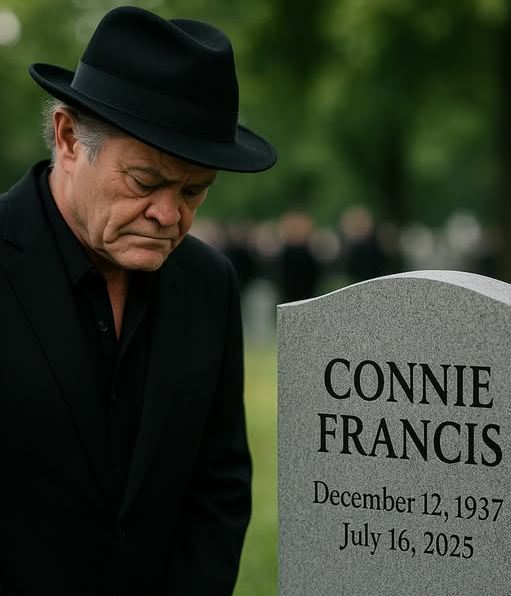
When fans think of Micky Dolenz, most remember the laughter, the charm, and the unforgettable energy of The Monkees. For decades, he was the voice behind songs that defined a generation. But on this particular night, Micky wasn’t the entertainer everyone knew. He wasn’t the jokester, the singer, or the beloved TV star. Instead, he stepped onto a dim-lit stage carrying something far heavier than a setlist: memory, love, and loss.
Wearing a black fedora pulled low over his eyes, Micky Dolenz moved quietly toward the center of the stage. His chest rose and fell with a trembling breath, as if holding back everything he was about to let go. In his hand rested a single red rose, delicate and fragile, yet powerful enough to carry the weight of fifty years of friendship and admiration.
There were no bright lights. No Monkees’ fanfare. No band waiting in the wings. Just Micky, the piano, and the hush of memory that filled the room like an invisible guest.
And in that silence, he whispered words that would send chills through everyone present:
“Connie, this one’s for you.”
A Tribute Beyond Applause
This wasn’t just another performance. It wasn’t meant for record sales, applause, or even recognition. It was personal. Micky Dolenz wasn’t there as a celebrity. He was there as a friend, honoring the memory of Connie Francis, the legendary singer whose voice once defined an era.
Instead of breaking into a familiar Monkees hit or cracking a joke to lighten the moment, Micky made a choice that showed just how much this tribute meant to him. He sat down at an old upright piano, a piece of history itself, rumored to be the same one Connie once touched in a Jersey ballroom long ago. Whether fact or myth, it didn’t matter. On this night, the piano was sacred.
With a tenderness that seemed almost like a prayer, he placed the rose on the edge of the piano and whispered the song title:
“Where the Boys Are.”
And then… he began to play.
The Song That Floated Through Time
The notes didn’t come in perfection. His voice wavered, carrying the rasp of age and the scars of time. Yet, that imperfection made it real. Every note carried decades of respect, heartbreak, and reverence.
It wasn’t the soaring version that Connie Francis had once made famous. Instead, it was something quieter, more intimate — almost like a private conversation across the years. Each note floated through the air, weaving into the stillness of the room, echoing like a whisper from the past.
For Micky, this wasn’t just a performance. It was a farewell. It was his way of calling across time, of honoring not just the legend that Connie Francis was, but the friend she had been.
Memory in Every Chord
The song didn’t rush. It unfolded slowly, deliberately, as though each key pressed was unlocking a different memory. Some in the audience closed their eyes, hearing not only Micky’s wavering voice but also Connie’s youthful tones carried through time.
The performance felt less like a concert and more like an act of remembrance. It was as though Micky was sitting in a quiet room, speaking to Connie one last time — thanking her, honoring her, and saying goodbye.
Somewhere near the final verse, Micky’s eyes closed. He wasn’t just playing for the people in the room anymore. In his mind, he was somewhere else. Maybe it was backstage at American Bandstand. Maybe it was 1961, the height of Connie’s fame. Maybe it was a simple moment in time when music brought two friends together.
A Rose, A Whisper, and Silence
When the final chord lingered and faded into the silence, Micky didn’t stand or smile. He didn’t look for applause. Instead, he placed the rose gently atop the keys, bowed his head, and whispered words that broke the hearts of everyone listening:
“They waited for you, Connie. And now… you’re home.”
There was no encore. No second song. No spotlight fading into applause. Just silence — a silence so profound that it spoke louder than any ovation ever could.
Why This Farewell Matters
In an era where goodbyes are often loud, public, and broadcast across social media, Micky Dolenz chose a different path. His farewell to Connie Francis wasn’t about spectacle. It was about intimacy.
Some goodbyes are shouted from the rooftops. Others are wrapped in silence. This one was the latter — a private, reverent moment shared with those lucky enough to be in the room.
It reminded everyone of something too often forgotten: at its heart, music isn’t about fame. It’s about connection.
Micky’s tribute wasn’t polished. It wasn’t designed for charts or streams. Instead, it was love translated into sound. It was memory given a voice. And it was respect expressed in the simplest, most human way possible — through music and silence.
Connie Francis: A Voice That Endures
To understand the weight of this moment, one must remember who Connie Francis was. Rising to fame in the late 1950s and early 1960s, her songs like “Where the Boys Are” and “Who’s Sorry Now” became timeless anthems of love and longing. Her voice carried across radios, television, and concert halls, giving hope to the brokenhearted and strength to those in love.
For Micky Dolenz — and for countless others — Connie wasn’t just a singer. She was a symbol of an era, a voice that defined the soundtrack of their youth.
That’s why this tribute felt so powerful. It wasn’t just about honoring a performer. It was about remembering a friend, a woman whose influence still lingers long after the final note.
Music as Memory
Micky Dolenz’s farewell performance stands as a reminder that music has a power beyond entertainment. It holds memories. It bridges time. It allows us to connect with those we’ve lost, even when words fail.
Every trembling note, every whispered lyric, every silent pause between chords carried the weight of half a century of friendship and admiration.
And when Micky left the stage, he didn’t leave as the Monkee fans had always cheered for. He left as a man who had given everything he could in the only way that mattered — with music, reverence, and a rose.
Conclusion: A Goodbye That Lasts Forever
There are moments in music history that transcend performance, and Micky Dolenz’s tribute to Connie Francis is one of them. It wasn’t flashy. It wasn’t broadcast to millions. But for those who witnessed it, it will remain unforgettable.
Because some goodbyes aren’t meant to be loud. They’re meant to be quiet. To linger. To remind us that love, memory, and respect don’t fade — they echo, softly, like a song that never ends.
And on that night, beneath the stage lights, Micky Dolenz gave the world not just a performance, but a lesson:
The truest tributes are the ones whispered, not shouted.
With a black fedora, a trembling breath, a single red rose, and a song, he honored a legend the only way a true friend can.
With love. With music. With silence.
